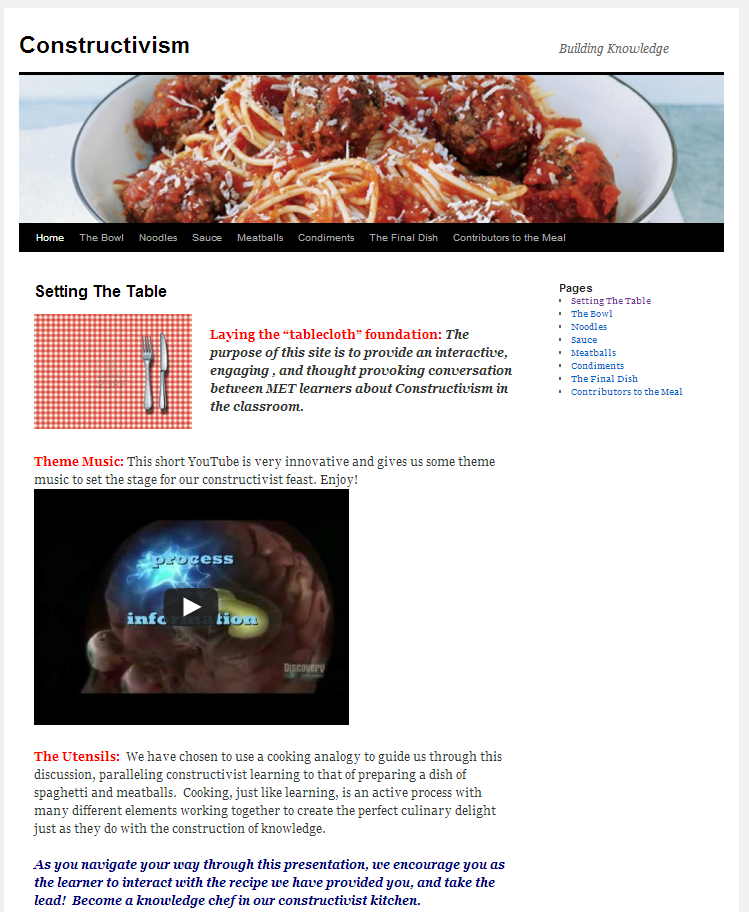As I learned in this course, there is no ‘best’ theory that can account for all aspects of human learning. As such, the overarching objective of this course was to provide exposure to a variety of theories, each having the potential to be useful in understanding learning and teaching in a variety of settings. However, this course showed me that I need to have an understanding of when and how different approaches should be utilized. Course assignments and activities focused on the application of different theoretical perspectives to realistic learning situations. In addition, one of the goals of this course was to develop a coherent, explicit sense of my beliefs about learning, and how the various theories hold together and are related to, or influenced by, the other perspectives.
Written Artifacts
Artifact 1: Thought Paper 1: My views of Behaviourist Principles in an Educational Setting
Artifact 2: Thought Paper 2: Teacher Empowerment through using Neural Understanding for Teaching
Artifact 3: Thought Paper 3: von Glasersfeld and Constructivist Teaching
Artifact 4: Final Paper – A Lesson Plan on Plagiarism: Utilizing Behaviouralist, Cognitivist and Constructivist Learning Theories
Technology Artifacts
Artifact 5: Google Docs Collaborative Forum for creation of Constructivist Blog Site
Artifact 6: Online Learning Conference
General Reflection:
A pioneer doesn’t always have someone to turn to for help, or a guidebook that tells where you went wrong. I think the most valuable trait in a technology pioneer is being able to “figure it out,” because sometimes there is not much of a basis to build on nor people to support you. Therefore a certain amount of confidence and intuition is important.
The pioneer metaphor tells me that educators need to fully understand the fundamentals of pedagogical theory. Just as pioneers were well prepared for their journey, a technology pioneer must know base their learning activities on sound principles and a thorough awareness of the students and their learning context.
Reflecting toward the future:
What do I see as the supports that would help me to further cultivate my practice of pioneering leadership?
- Met has taught me to seek out the answers to my questions online, how to search for opensource tools to do the work that I need, and to turn to colleagues both f2f and online. These are valuable practices that will “see me through” the challenges that I will experience in the future.
- Reviewing the learning theories has been a most useful experience as I now feel refreshed in the research and practice.
- I learned in this course that I do not simply utilize the teaching practices from only one learning theory, in fact I utilize a common grouping of three: Behaviouralist, Cognitivist and Constructivist Learning Theories.
Implementation, surprises, and consequences? Regrets?
- Implementation of the three learning theories in the creation of the lesson plan was a great experience and it helped me to realize that I incorporate these theories innately and instinctively. This was actually a surprise as I hadn’t ever considered this before.
- I think the consequences of knowingly incorporating various learning theories in my work will assist me in ensuring that my pedagogy is correct. That is only a positive!
- No regrets!
How does this learning affect your practice or what new perspectives have you discovered in reflection?
- Constructivism alone will have profound implications for how I can restructure my `traditional’ instruction because it transitions the teacher’s role from “sage on the stage” to the “guide on the side”; it will assist me in incorporating “higher order” skills such as problem-solving, reasoning, and reflection; it will force me to incorporate meta-cognitive approaches which will enable my students to learn how they learn; I will include more open-ended evaluation of learning outcomes; and I will include more cooperative and collaborative learning skills.
- Through this course I have realized that learning about learning is a continuous journey that will require further study, practice, and reflection.
| Pioneer Trail | ||||
| Bullet Trail |
